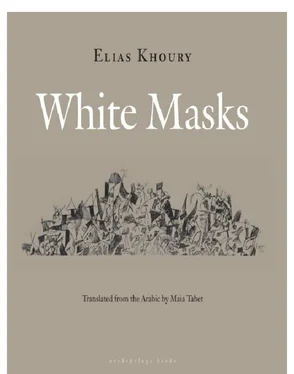The boy had taken up boxing — you should have seen what a figure he cut — and said he wanted to go professional. Khalil pinned all his hopes on him: “Why shouldn’t he become a great boxer, why not, like Muhammad Ali Clay, or even better?”
With these words, the woman looks across at the photograph of her son in his boxing gear, walks over to it, wipes her palm across it, and stands silently for a moment.
May God rest your soul in peace, Ahmad, if only you’d lived. . He took part in several tournaments, and he won! I attended a match once, and you should’ve seen how he leapt around the ring, like a real boxer, delivering punch after punch! When he took one in the face and I saw the blood, I dashed towards the ring, I wanted to tell him to get down from the ring, but Khalil grabbed hold of me and began cursing, so I went back to my seat and, in the end, Ahmad won the match! He knocked down his opponent, and the guy just lay there motionless while the referee slowly counted to ten and Ahmad looked on. Then the referee raised Ahmad’s hand in the air and I saw Khalil thrust his own arm up and run to embrace him. Ahmad competed in several championships and won every one of them — he was always telling me how he was going to take part in the national championships, featherweight category. I’d laugh to myself at the expression, as if a feather weighed anything. Really, men are pea-brained, they’re like little children! Still, it was our lot, the luck of the draw, and there was nothing we could do about it.
No, the war didn’t have anything to do with it. Nothing changed during the war — it had nothing to do with it. Khalil stopped going to the main post office down in Riad al-Solh Square, and joined the Mazra’a branch instead — he couldn’t bear to sit at home like a housewife, he said. But later he had to, with the shelling everywhere, there was no way to go out, and after I begged him to stay home, he agreed. His salary went on being paid and we lacked for nothing. We thanked our lucky stars, disaster never struck, just the one shell landing nearby, but we were in the shelter and nothing happened, al-hamdulillah! I said to Khalil, why don’t you do the same as our neighbor Abu Tareq? You know, selling cigarettes from a makeshift sidewalk stall? His salary was no longer enough, you see.
“No,” he said, “I am a civil servant and I won’t work anywhere else than at the post office, handling calls and telegrams. I am not about to sell cigarettes. .”
Ahmad went on training regularly, and we steered clear of politics. Khalil always said: “When the winds of change are blowing, keep your heads.” And we kept our heads pretty well. Even the newspapers didn’t cross our threshold — Khalil got them only at work; and anyway, he didn’t read them, it was only for the crossword puzzles and the sports page. But then, they did. . you know how it is, a man, at home all day long, with nothing to do, helping out with chores like fetching the water — the water supply was cut off — going off every morning with big plastic containers and coming back all breathless. Ahmad never helped out; and anyways Khalil wouldn’t have let him. “No,” he’d say, “Ahmad must concentrate on his training, leave him alone.” And so, with nothing to do at home, he started reading the papers, even though he always said he hated politics.
“It’s nothing to do with us,” he’d say. “We are just the playthings of foreign powers. . kicking us around like a ball! It’s nothing to do with us.”
You know how it is. . I mean with the war and everything, it’s inevitable, isn’t it. . all the young men in the neighborhood were donning uniforms, mashallah . . When Ahmad told me he wanted to join up, I begged him not to, I told him, no, you’re our only son and only sons don’t go to war; our only son, and you’re going to die! Then these words reeled off his tongue, I don’t know where he got them from, he said all these things I didn’t understand. And one day he vanished. Khalil was so upset, he stormed into the kitchen swearing and smashed all the plates; then he made the rounds of all the political party offices, asking after him and pleading, but all they said was that Ahmad was going through military training in the mountains and that he’d be back.
And so he was. . After three long weeks of sorrow and grief and penance, he came back, strutting around in his fatigues with a rifle slung over his shoulder, all puffed up with pride. I caught him one day admiring himself in the mirror, in his high combat boots and his khakis, caressing his rifle! In the beginning, Khalil refused to speak to him, and just sat by the radio, muttering to himself. Then we got used to this new state of affairs — the devil’s curse on us humans, how we get used to anything! Even the death of our sons! Then Ahmad started bringing money home; he’d give some of it to his father, who was on speaking terms with him now, and they would have political discussions.
I, for my part, was worried. But Ahmad’s father, may his soul rest in peace, seemed unconcerned, and he became interested in what the boy brought back — nothing very valuable, mind you, a bracelet here, three gold rings there, and other useless trifles. But it helped his father cope with the terrible price increases that were killing us. Khalil stopped muttering to himself, but he was always worried about the boy and waiting for him to get back.
And poor dear, how he got back. .!
No, no, Ahmad’s death didn’t change anything. He was killed in combat in 1976, four years ago now, but no, nothing changed. Khalil was just the same as always. Yes, of course it was a crushing blow, and he began to show signs of aging — his hair went completely white — but he didn’t change.
It was ten in the morning that day, Khalil wasn’t home. They had knocked at the door, but I hadn’t heard them — the power was off, the doorbell wasn’t working, and I was in the kitchen with the racket of the Primus stove. Then I heard shouting and clamoring at the door, so I opened up. Three young men in fatigues stood there and I told them Ahmad wasn’t home. I was about to shut the door but they insisted on coming in. What’s going on? I thought, and then my heart started pounding, and I knew that Ahmad. . When I asked about him, one of them said, “Steady now, Auntie.”
“What happened to him?” I screamed hysterically, as they trooped into the living room. The three of them sat down, I remained standing, and the oldest one did the talking.
“Sit down, Auntie, we need to speak to you,” he said. I burst into tears.
“Ahmad’s dead!” I cried.
They nodded, and, overcome with the shock, I began to wail and scream and tear at my clothes. Then Nada was there, though I hardly even noticed, and then all the neighbors came, men, women, hollering and ululating and carrying on — nothing made any sense. They said he died far away — in Qomatiyyeh — and that his body was in the morgue at the American University Hospital; he’s a martyr, they said, he was killed in combat. Khalil, who had come home to all the screaming and wailing, sat in a corner, wordless. He just nodded silently as the three young men informed him the funeral procession would go directly from the hospital to the Martyrs’ Cemetery, as they weren’t able to retrieve the body immediately, and Ahmad had been dead for over forty-eight hours.
“You know how it is, Uncle,” one of them said, “the body won’t last. It’s best that way.”
Khalil went to identify the body, and when he came back he said nothing, just ground his jaw back and forth and recited Qur’anic verses under his breath.
Then we went to the American University Hospital — that is to say, they went — and brought the coffin home. They took him to his room and opened the coffin for a minute so I could see him, but I never saw him. Everyone saw him but me. Then they hoisted him up on their shoulders and carried him to the cemetery, firing in the air, chanting slogans and singing. The whole time, Khalil muttered and talked to himself, saying that was the way they wanted to do it. They wouldn’t let us wash him-a martyr shouldn’t be washed, they said, he is cleansed by his own blood — and they buried him just like that. . doing exactly as they pleased! Then they lined up beside me and received condolences while I stood like a stranger in their midst, as if it had been their son. Afterwards, they brought food over to the house, and milled about everywhere, doing everything themselves. . as if we didn’t exist, as if Ahmad hadn’t been our son.
Читать дальше












